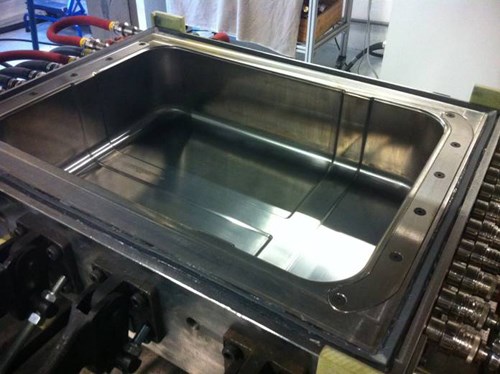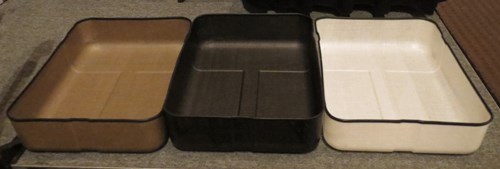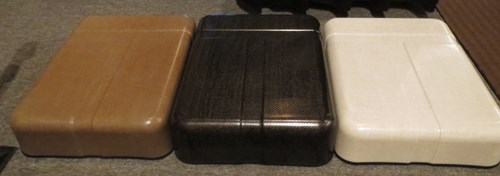RocTool announces new high-volume molding process
Light Induction Tooling (LIT) combines a simple, low-pressure molding system with fast heating and cooling technology to produce composite parts in cycles ranging from 105 to 310 seconds.

RocTool's LIT molding system includes a metallic female mold combined with a male silicone half. Resin is provided via prepregging or in powder or film form. Pressure of up to 30 bar/420 psi is provided by a pressurized air system only. Cycle times range from 105 to 310 seconds, thanks mainly to RocTool's fast-heating induction technology.
Mathieu Boulanger, business development director at inductive mold heating specialist RocTool (Charlotte, N.C., USA and Le Bourget du Lac, France), announced at CompositesWorld's Thermoplastics Composites Conference for Automotive (June 11-12, Novi, Mich., USA) the launch of a new tooling system and molding process that the company says is well-suited for high-volume manufacturing applications.
Called Light Induction Tooling (LIT), Boulanger says the system consists of steel female mold and a silicone male mate. A unidirectional or woven fiber reinforcement (carbon, glass, natural or aramid), either dry or prepreg, is placed in the female mold. If reinforcement is dry, resin is added in powder or film form; resin matrix can be thermoplastic or thermoset
. The silicone male core is then closed and clamped to the female base. Pressure up to 30 bar/420 psi is provided by air injected into the mold as RocTool's inductive heating system ramps up to 280°C/536°F in 45 to 90 seconds, depending on part and material. The same system quickly cools the mold and part via water in another 60 to 120 seconds, for a total cycle time of 105 to 310 seconds.
Boulanger says the system requires no preheating, provides a resin-rich surface, requires no resin injection, allows for thin walls and offers good temperature control. Boulanger exhibited at the conference three suitcase shells molded with LIT using carbon, glass and natural fiber infused with PET and PP resin (see photo). Wall thickness of the shells is 1 mm/0.04 inch.


Luggage shells molded with RocTool's LIT system, using natural, carbon and glass fiber reinforcement with thermoplastic resin matrix.
Related Content
-
CAMX 2022 exhibit preview: Parabeam
Parabeam’s 3D E-glass woven fabrics, particularly ParaGlass and ParaTank, continue to advance composite sandwich structures with high flexibility, strength and application versatility.
-
Materials & Processes: Fabrication methods
There are numerous methods for fabricating composite components. Selection of a method for a particular part, therefore, will depend on the materials, the part design and end-use or application. Here's a guide to selection.
-
Materials & Processes: Fibers for composites
The structural properties of composite materials are derived primarily from the fiber reinforcement. Fiber types, their manufacture, their uses and the end-market applications in which they find most use are described.










.jpg;maxWidth=300;quality=90)


